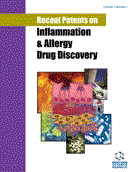Abstract
Psoriasis is a cutaneous inflammatory disease, which affects 1-5% of general population and can have, particularly in its moderate-severe forms, a significant impact on the quality of life of patients. Although the etiopathogenesis of psoriasis is not yet fully understood, it has been demonstrated that the disease is the result of a complex interaction of genetic, endogenous and environmental factors, where the immune system has a pivotal role. For this reason, the immune system is the main target of many treatments for psoriasis. The most recent evolution in this field are the so-called biologic agents, custom-designed biomolecules obtained by bioengineering. This review summarizes the currently available data about efficacy, safety and undesired effects of five patented biologics officially approved for the treatment of moderate-to-severe psoriasis: adalimumab, alefacept, efalizumab, etanercept and infliximab. Some patent applications concerning possible future evolutions of the above biologics are also discussed.
Keywords: Psoriasis, therapy, biologics, efficacy, safety, side effects, adalimumab, alefacept, efalizumab, etanercept
 4
4














